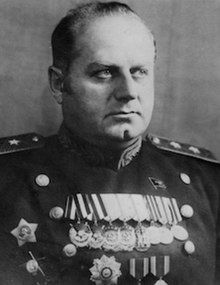Mikhail Gvishiani
Mikhail Maksimovich Gvishiani | |
|---|---|
 | |
| Native name | მიხეილ გვიშიანი |
| Born | 6 January 1905 Abastumani, Tiflis governorate, Georgia, Russian Empire |
| Died | 2 September 1966 Tiflis, Georgian SSR, USSR |
| Allegiance | |
| Service | OGPU / NKVD |
| Years of service | 1928–1953 |
| Rank | |
| Commands | various NKVD related divisions and departments Primorsky Krai NKVD Samara Oblast NKVD 3rd Special Division of the First Main Directorate |
| Battles / wars | World War II |
| Awards | Order of the Red Banner (2) Order of Suvorov, 2nd class Order of the National Flag |
Mikhail Maksimovich Gvishiani (Georgian: მიხეილ გვიშიანი, Russian: Михаил Максимович Гвишиани; January 6, 1905 – September 2, 1966)[1] was a Georgian officer of the Soviet NKVD. He oversaw the deportation and relocation of ethnic groups from the North Caucasus, which was planned and organized by Lavrentiy Beria and approved by Stalin. Mikhail Gvishiani is particularly known for his involvement in the burning of some 700 civilians in what would later become known as the Khaibakh massacre.
Early life
[edit]Mikhail Givishiani was born into a Georgian farmworker's family. He graduated school and became active as assistant-chef, assistant driver and also watchmen for a hospital in Akhaltsikhe. In 1924 he began to work as a clerk and deputy department manager in a sub-branch of the Soviet Ministry of Finance. After entering the Red Army in 1928, Gvishiani was assigned to the Joint State Political Directorate (OGPU) and posted for matters concerning the Far East of the Soviet Union, until 1938.
NKVD career
[edit]From 1928 to 1938 lieutenant Gvishiani was assigned to and took charge of various divisions and departments of mainly Georgian branches of the Soviet secret police apparatus NKVD. He got promoted to major in 1936 and two years and two promotions later in 1938 was deployed as chief to 3rd Special Division of the First Main Directorate in the Novosibirsk Oblast where he served as a Commissar of State Security 3rd Class. During the Soviet invasion of Manchuria in 1945 Givishiani was awarded several decorations for repatriating all industrial assets from Manchuria to the Soviet Union, for which he was promoted to lieutenant general the same year.[2]
Operation Lentil
[edit]On February 27, 1944 Colonel Gvishiani ordered the killing of over 200 Chechen civilians via telegram in what is known as the Khaibakh massacre.[3] In 2014 the Russian Ministry of Culture dismissed any claims of a massacre in Kaibakh as "historical falsification", even though an overall consensus of other sources consider the massacre historical fact.[4] The Russian Ministry of Culture did not dispute that he took a significant role in the deportations of ethnic groups during Operation Lentil.[5]
Ousting and discharge
[edit]With Beria's downfall in 1953, Gvishiani lost his patron and as a political consequence was discharged, officially due to a conflict of authority, and deemed unworthy to hold the rank of a general officer. However, he not imprisoned but was stripped of his rank.[6]
Family
[edit]His son, Dzhermen Gvishiani, was married to the daughter of Communist Party Central Committee member Alexei Kosygin, who later became prime minister. That connection likely saved his life.[7] His grandson Alexei Gvishiani, a prominent scientist, was born in 1948. His adopted daughter Laura Vasilievna Kharadze was first wife of future Russian prime minister Evgeny Primakov.
References
[edit]- ^ "მიხეილ გვიშიანი მაქსიმეს ძე 1905-1966წწ საბჭოთა გენერალი, დაბ. აბასთუმანი სამცხე ჯავახეთი". Archived from the original on 2022-11-21. Retrieved 2022-11-21.
- ^ "Краткие биографии и послужные списки руководящих работников НКВД". old.memo.ru. Retrieved 2017-12-20.
- ^ M., Gammer (2006). The lone wolf and the bear : three centuries of Chechen defiance of Russian rule. Pittsburgh: University of Pittsburgh Press. ISBN 9780822958987. OCLC 62329896.
- ^ "Russia bans 'historically false' film on Stalin deportations of Chechens". AFP.com. 2014-06-02. Archived from the original on 2014-06-02. Retrieved 2017-12-20.
- ^ Salamat Gayev, Musa Hadisov, Tamara Chagaeva. Хайбах: Следствие продолжается Grozny, 1994. pg 352
- ^ "Краткие биографии и послужные списки руководящих работников НКВД". old.memo.ru. Retrieved 2024-12-09.
- ^ "Gvishiani, Mikhail Maksimovich". Academic Dictionaries and Encyclopedias. Retrieved 2017-12-20.
- 1905 births
- 1966 deaths
- People from Tiflis Governorate
- People of World War II from Georgia (country)
- Candidates of the Central Committee of the 18th Congress of the All-Union Communist Party (Bolsheviks)
- First convocation members of the Supreme Soviet of the Soviet Union
- Third convocation members of the Supreme Soviet of the Soviet Union
- Recipients of the Order of the Red Banner
- Recipients of the Order of the Red Banner of Labour
- Recipients of the Order of the Red Star
- Recipients of the Order of Suvorov, 2nd class
- Commissars 3rd Class of State Security
- NKVD officers
- Soviet Georgian generals
- Soviet Georgian NKVD officials
- Soviet lieutenant generals
- Soviet military personnel of World War II
- Genocide perpetrators
- Soviet mass murderers
